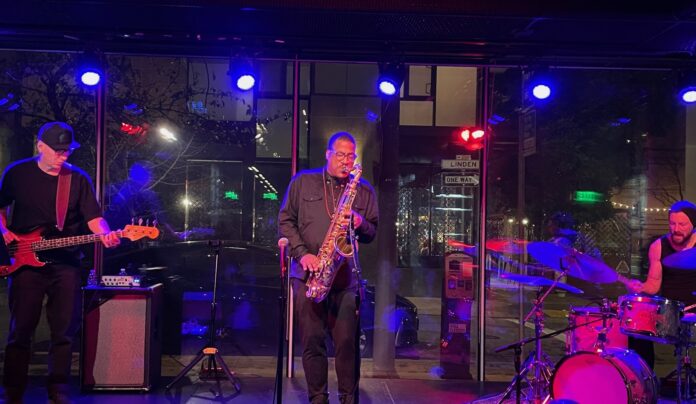Last Friday night at SFJAZZ’s Joe Henderson Lab, James Brandon Lewis—saxophonist, composer, and CalArts graduate—led his power trio line-up into free jazz garage punk territory. The abstract, combustive forces gusting from the stage, sometimes accompanied by ambulance wail and fire truck lights shining through the room’s glass walls, peeled back the ears and minds of gray-haired visitors and dreadlocked art patrons alike. To chase energy, this triad ran it hard and quickly in this hour-long Noise Pop performance, showcasing a meteoric glimpse of where jazz can go, as preached by Lewis’ tenor saxophone.
With tracks from a recent album, fiery covers of Ornette Coleman songs, and the creative idea to make his reed instrument sound like a record being pulled back on a turntable.
Wha?
Be mindful. When Sonny Rollins, jazz legend and nonagenarian, does something he hardly ever does—lends his support to a young lion—get hip, wise, and in line, because Rollins never disappoints, even on a bad day.
Lewis, who the New York Times says “embodies and transcends tradition,” was surrounded by accomplished and like-minded improvisers in rhythm, including Andy Niven on drums and Josh Werner on electric bass. The two perform as servers, volley partners, and timekeepers in the push-pull of simmering charts served at warbling tempos.
The eleventh album Lewis has released as a bandleader, Eye of I, begins with the gospel-tinged invocation “Foreground,” which sandalwoods the space before setting it ablaze. He told the media that this project had to be “loose, in the moment, running on pure visceral instinct” before releasing it.
The Jesup Wagon, his critically acclaimed previous record called for extensive book research. This time, risk and immediacy were the focus of the study, so he looked for the same rush he had previously felt when surrounded by free jazz greats, hip-hop MCs, and punk bands: an immediacy.
In his performance that evening, he introduced the heavyweight Ornette Coleman cover “Broken Shadows” with a generational hat tip—soloing the opening lines of John Coltrane’s “My Favorite Things;” “Lover Man,” made famous by Billie Holiday; and the ever-velvet-sounding “My One and Only Love,” put in the books by Coltrane vocalist Johnny Hartman. Lewis, however, used a trick to make the sax sound like it was breathing backward, giving the impression that vinyl was being queued in reverse on the turntable between the teasing of each of those standards.
Such a feat, a flex of sorts I’ve never witnessed IRT from a reed instrument, caught the pleasure from all in attendance with “oohs and ahhs” upon recognition.
Then this brother proceeded to burn the house down.
Lewis took the Coleman arrangement and extended it with a semi-driving, slightly dubby pace, turning letters into notes, paragraphs into chapters, and books into cannons. Discovering, ripping open, shouting at our collecive cultural turbulent space, by popping in and out of inner rhythms within the polyrhythms, skronking at the bottom of stanzas, squeaking melodies at the top of runs, building and blazing under the Herculean force of Niven pushing this wall of roiling salvo deeper into the furnace and Werner, bassist, pendulum-mastering the killer Sly and Robbie mechanism: Keeping the pattern simple yet complex.
Such a revelation on a Friday night.






